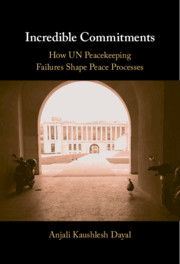Book contents
- Incredible Commitments
- Incredible Commitments
- Copyright page
- Contents
- Tables
- Acknowledgments
- 1 Introduction
- 2 The Social Context of International Peacekeeping and the Alternative Benefits of Bargaining
- 3 Methods and Case Selection
- 4 The Arusha Negotiations, 1990–1994
- 5 Guatemala, 1989–1996
- 6 Conclusion
- Bibliography
- Index
5 - Guatemala, 1989–1996
MINUGUA in Light of El Salvador
Published online by Cambridge University Press: 02 October 2021
- Incredible Commitments
- Incredible Commitments
- Copyright page
- Contents
- Tables
- Acknowledgments
- 1 Introduction
- 2 The Social Context of International Peacekeeping and the Alternative Benefits of Bargaining
- 3 Methods and Case Selection
- 4 The Arusha Negotiations, 1990–1994
- 5 Guatemala, 1989–1996
- 6 Conclusion
- Bibliography
- Index
Summary
This chapter evaluates the UN’s engagement in Guatemalan negotiations from 1989-1996. It asks how the Government of Guatemala (the GoG) and the Unidad Revolucionaria Nacional Guatemalteca (URNG), the coalition of rebel groups fighting and negotiating with the GoG, assessed the UN’s performance as the guarantor of agreements elsewhere, especially the concurrent peacekeeping success in neighboring El Salvador and the simultaneous failure in the Balkans, and how these assessments influenced the course of negotiations and the final agreement that emerged from their peace process. Drawing on archival material and oral histories, I find that participants looked nearly exclusively at El Salvador to assess the contours and possibilities of UN intervention—but they perceived the Salvadoran example as a negative one: both sides believed their Salvadoran counterparts had given too much away during their negotiations, and advocated for a smaller UN mission.This is surprising—influential credible commitment theories of peacekeeping predict that the UN’s success in El Salvador would enhance the Guatemalan parties’ confidence in the UN as guarantor. Instead, the UN’s banner success in El Salvador first prolonged the war in Guatemala and then produced a weaker agreement and a degraded capacity to enforce the peace.
Keywords
- Type
- Chapter
- Information
- Incredible CommitmentsHow UN Peacekeeping Failures Shape Peace Processes, pp. 131 - 163Publisher: Cambridge University PressPrint publication year: 2021

